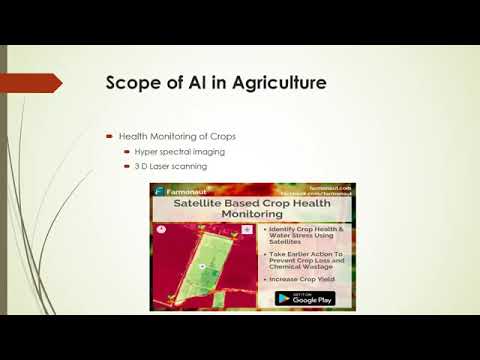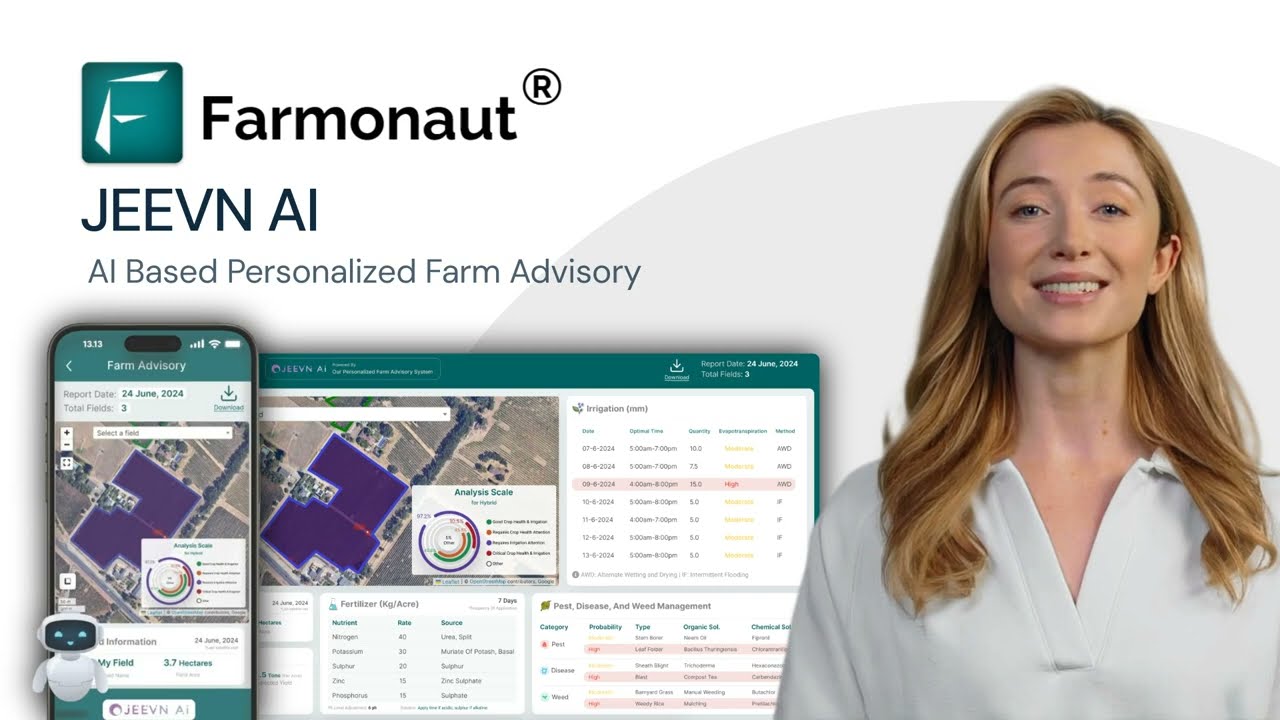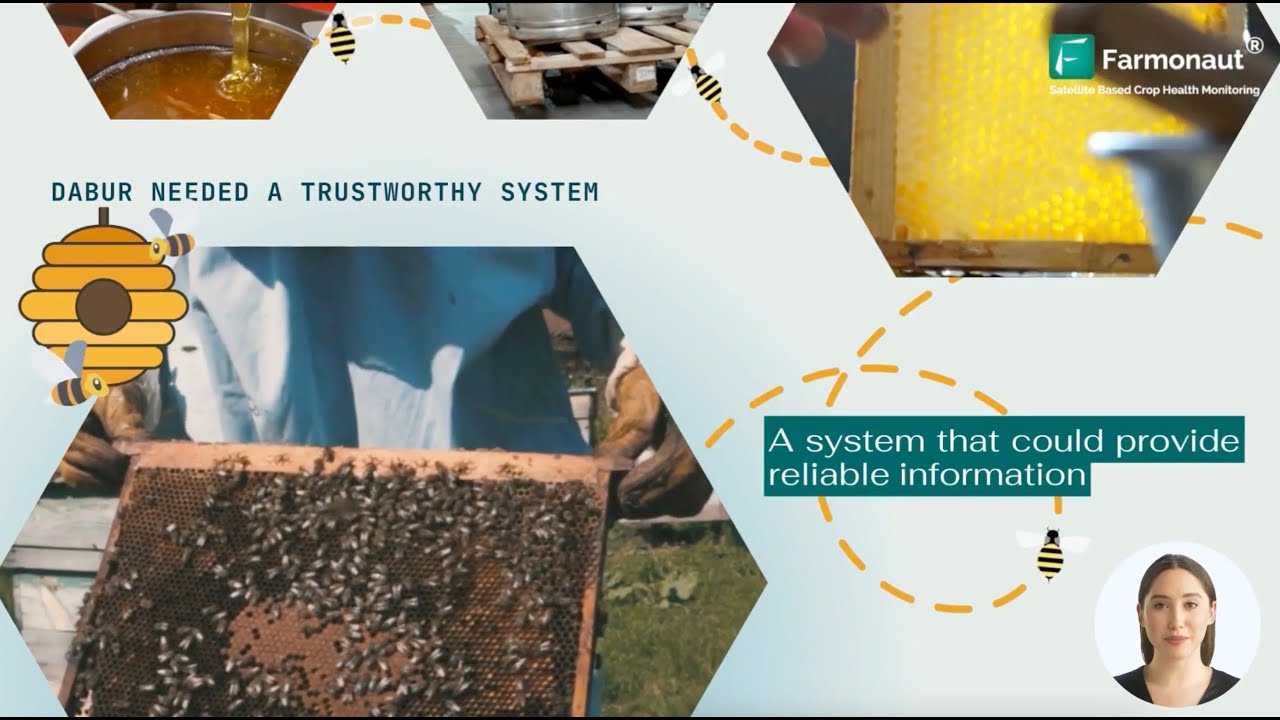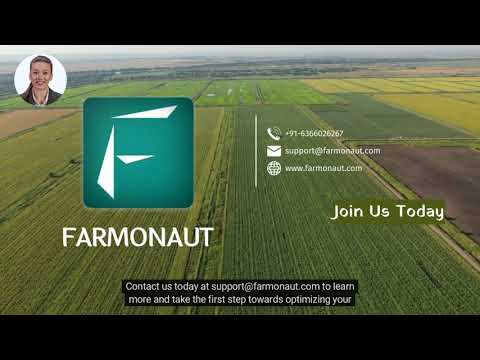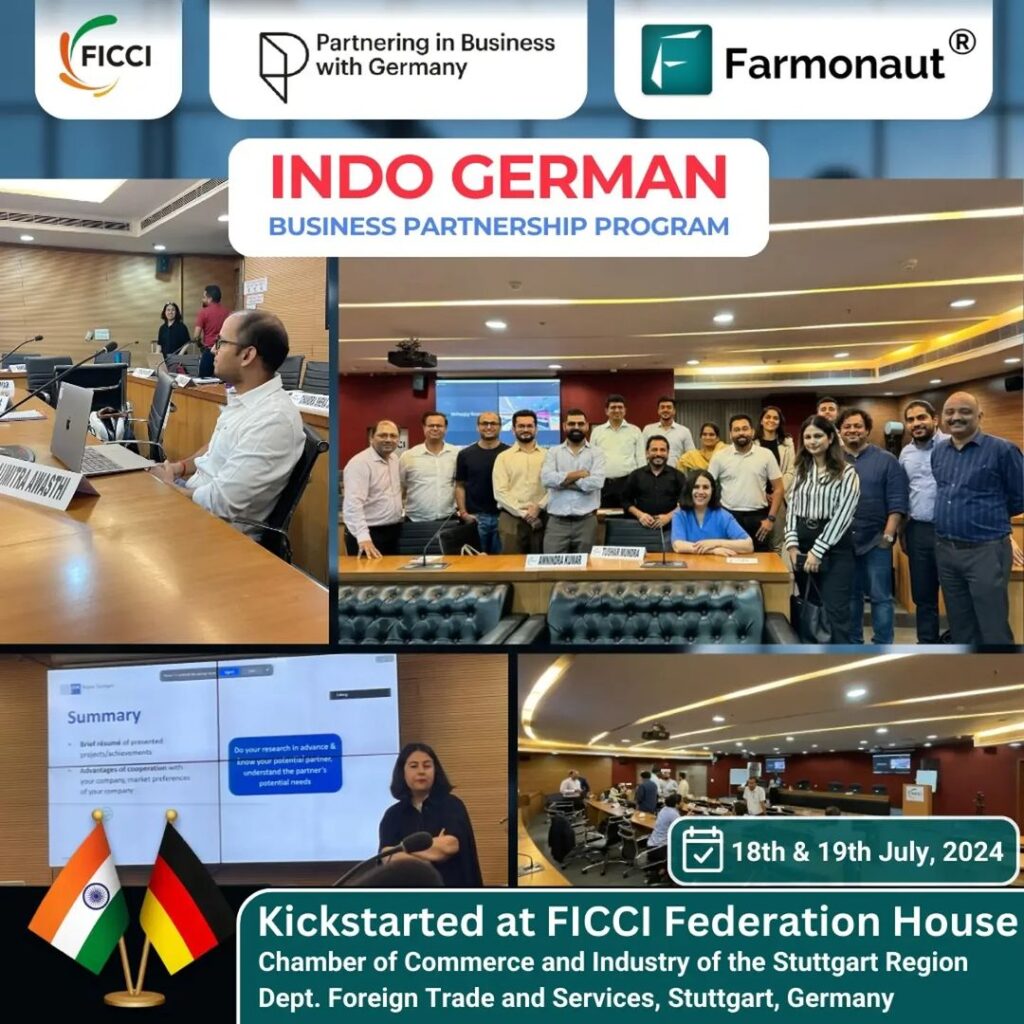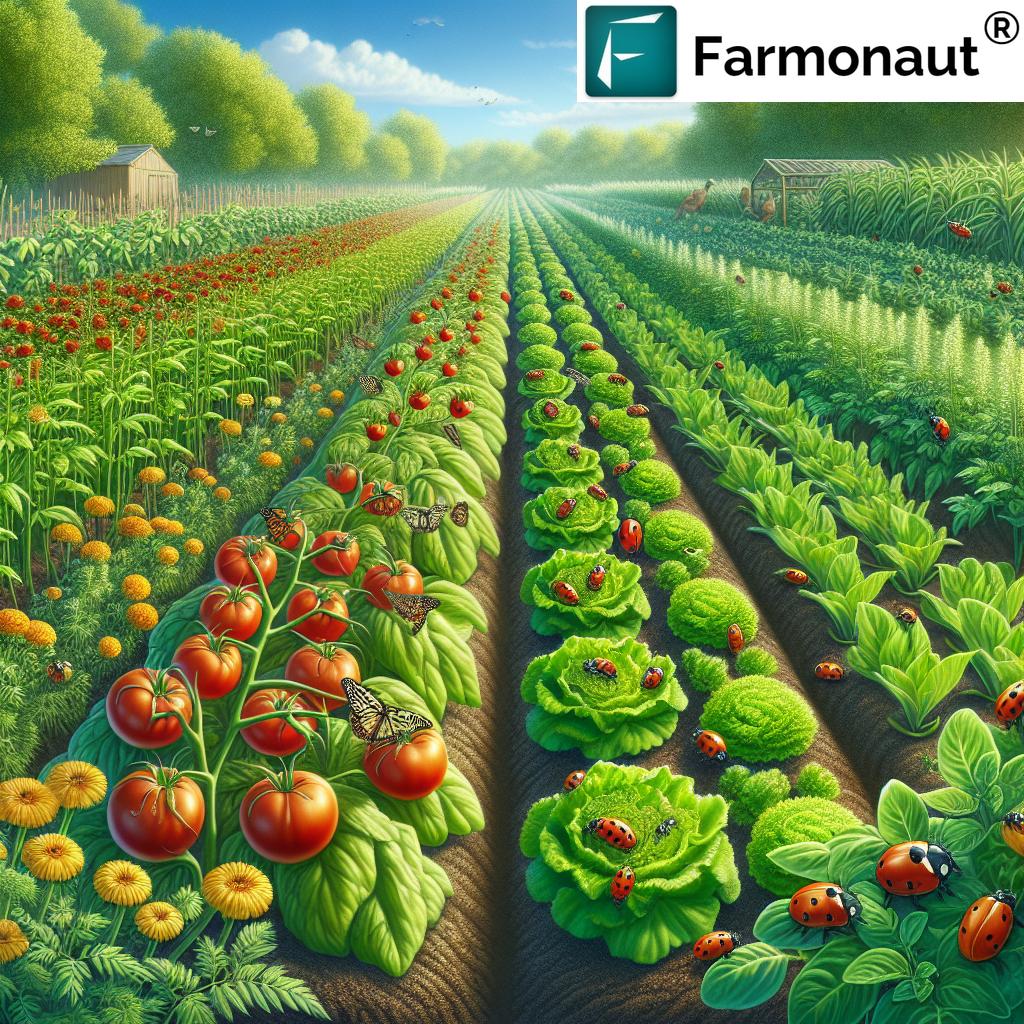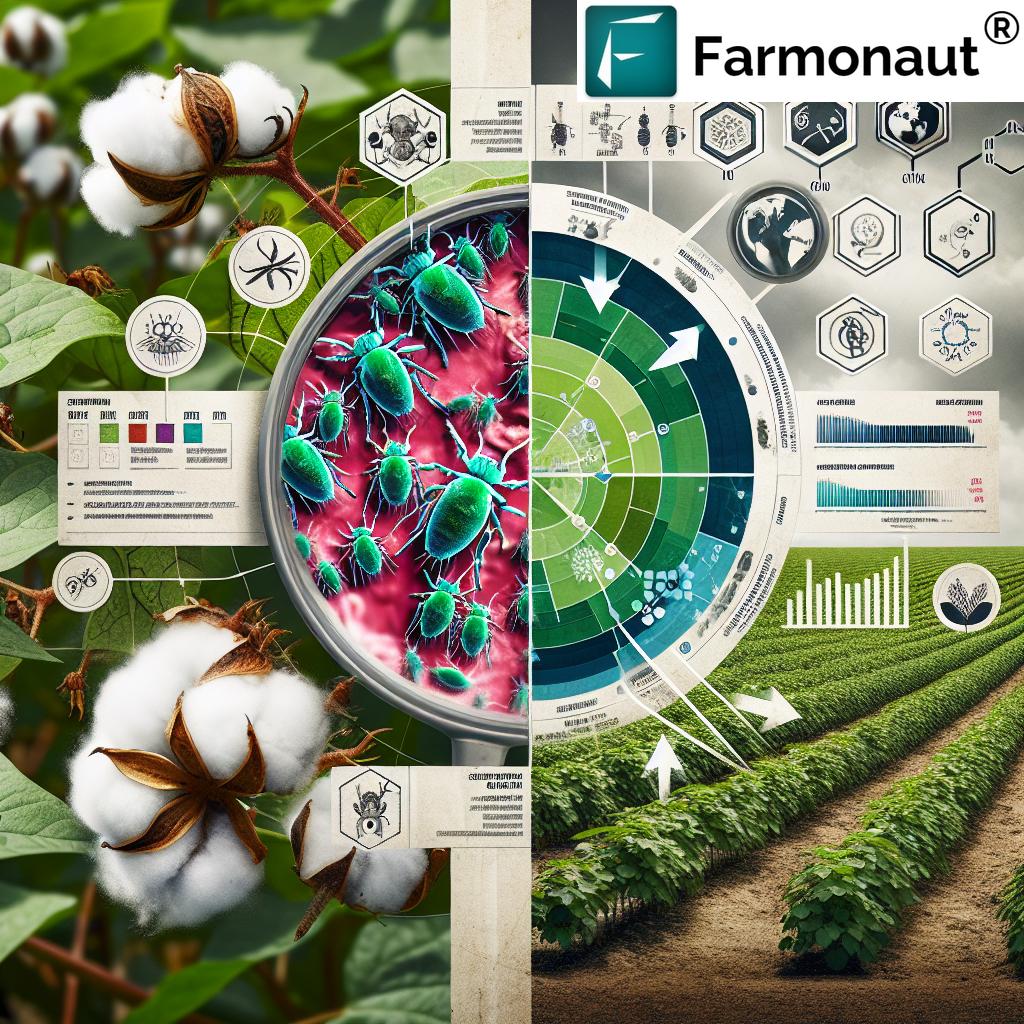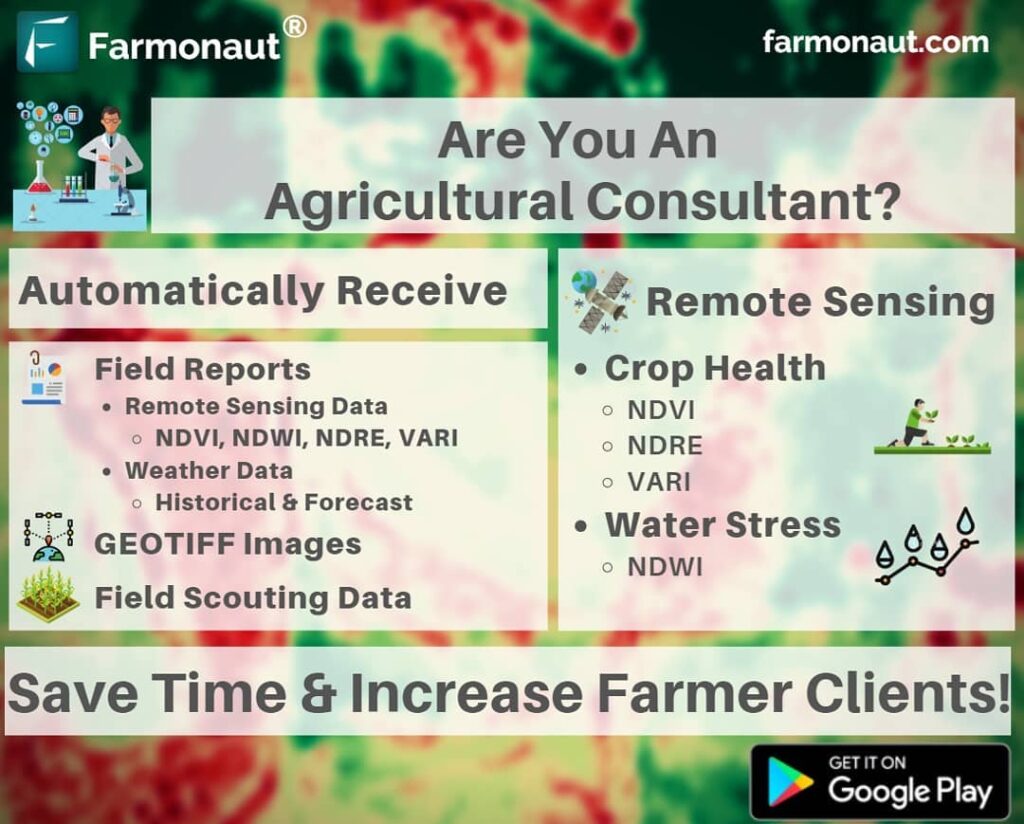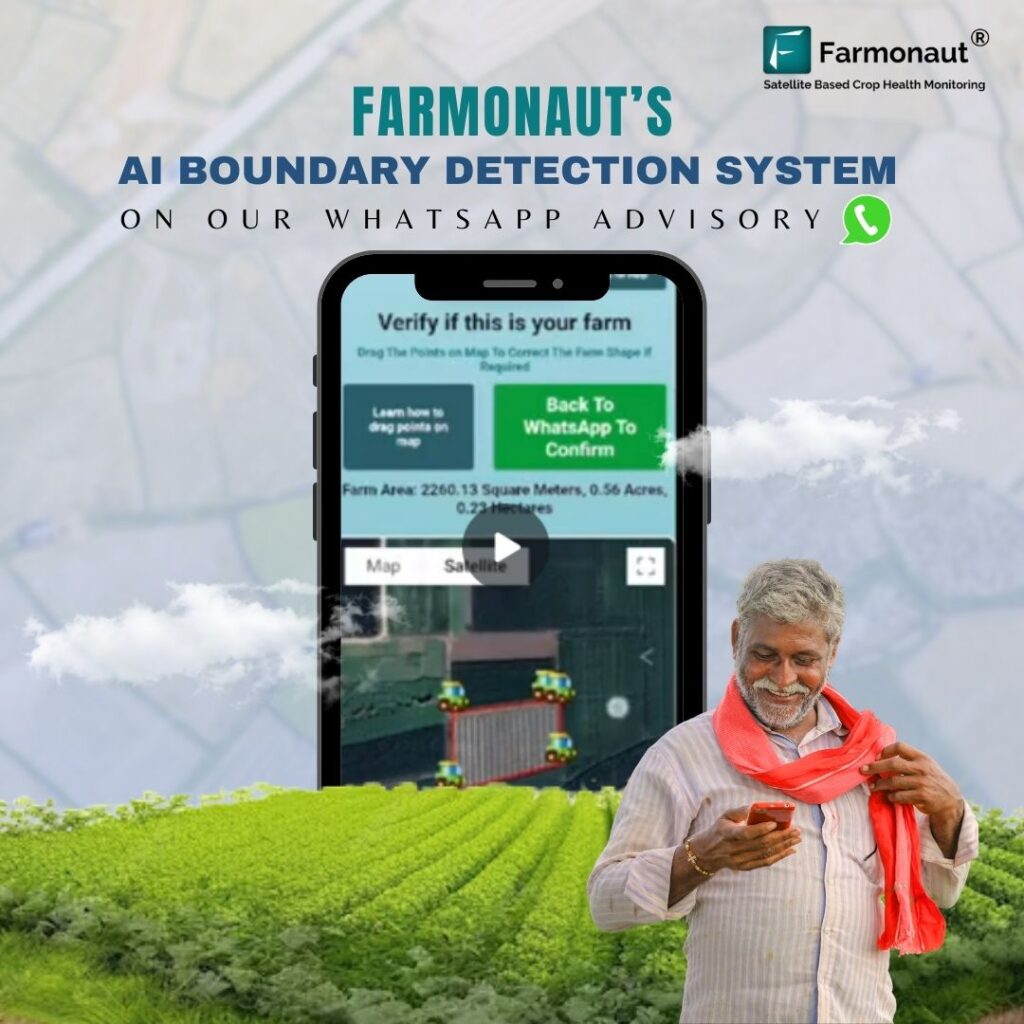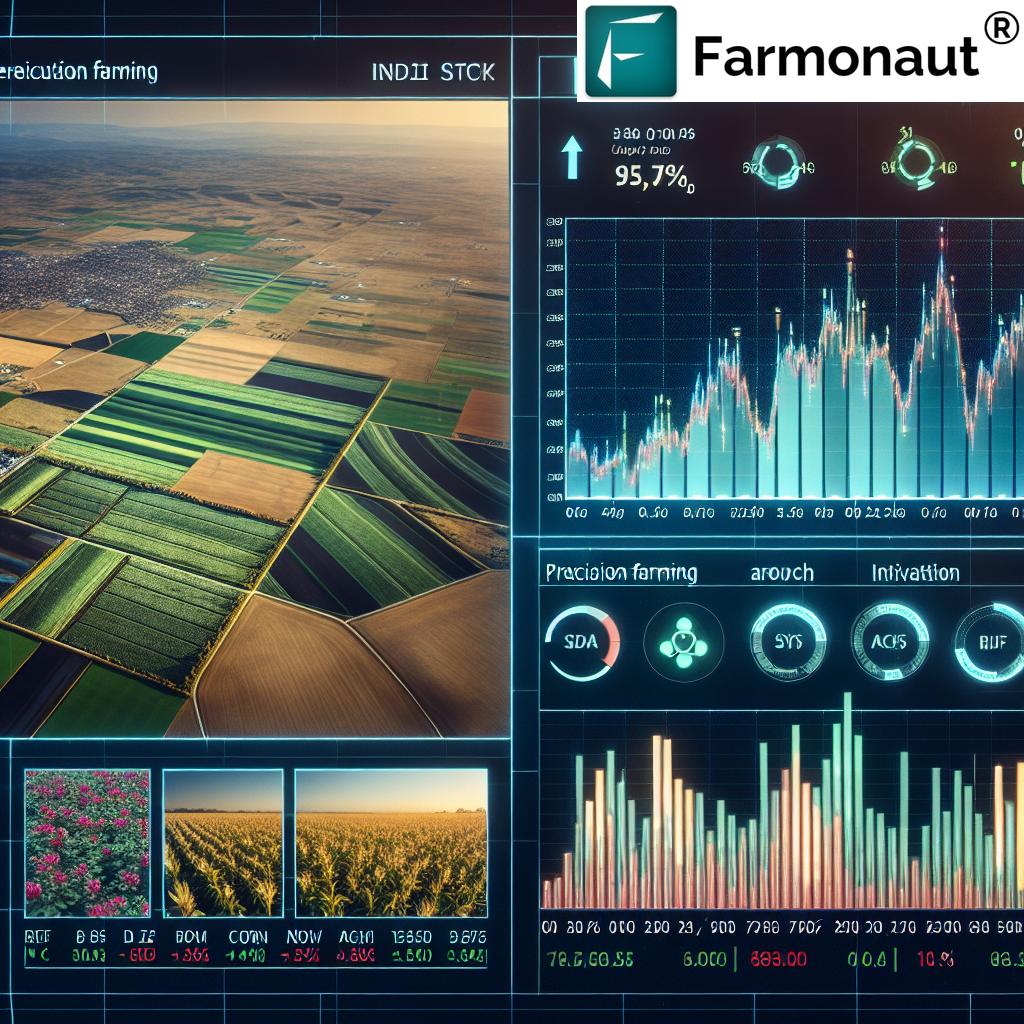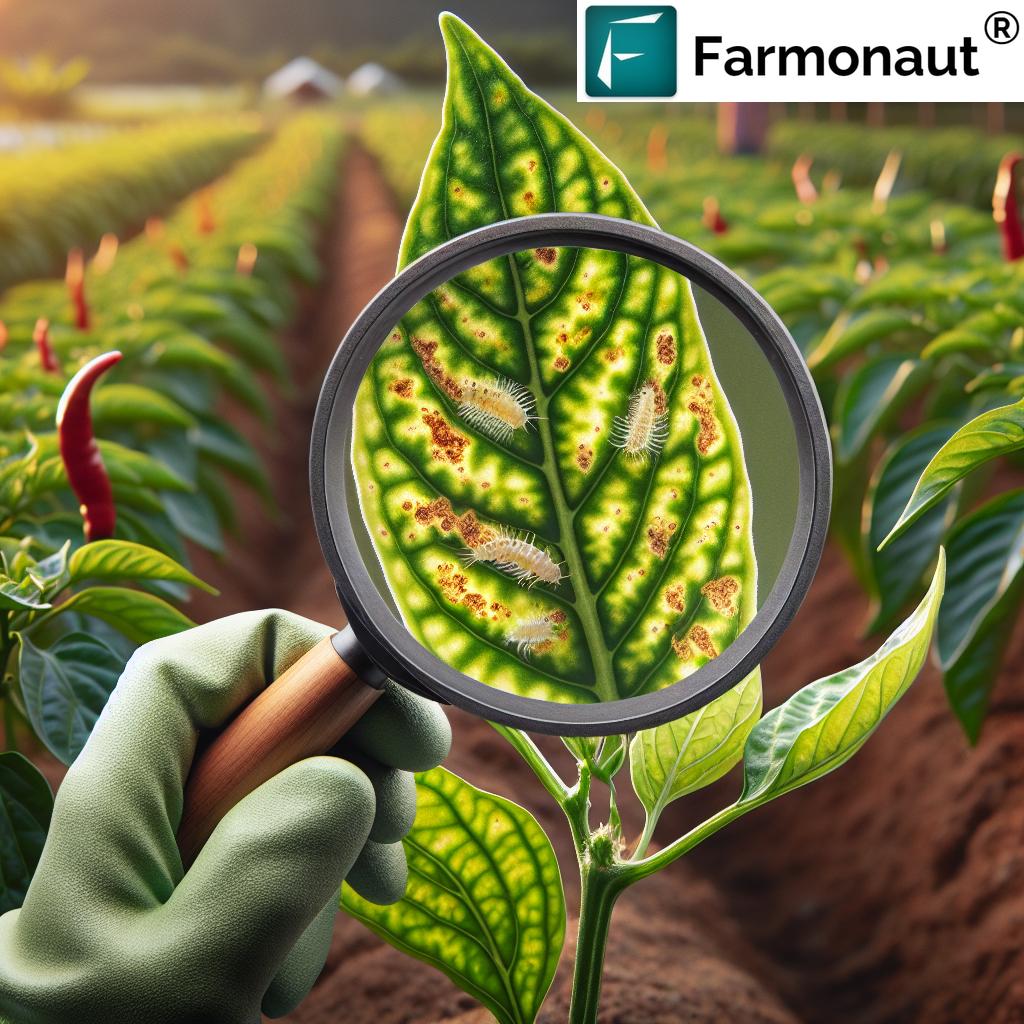Table of Contents
- Introduction: Agribusiness Marketing Strategies for the Digital Age
- Digital Agriculture Trivia: Impact and Adoption
- Why Digital Marketing for Agriculture is Essential
- Top 10 Agribusiness Marketing Strategies
- Embrace Digital Transformation
- Leverage Advanced Technologies: AI & IoT in Agriculture
- Focus on Sustainability and Ethical Practices
- Engage in Content Marketing in Farming
- Build Strong Customer Relationships
- Collaborate with Industry Partners & Local Initiatives
- Implement Data-Driven Marketing Approaches
- Focus on Branding and Packaging
- Utilize Influencer Marketing in Agribusiness
- Adapt to Market Changes & Evolving Consumer Preferences
- Comparative Strategy Effectiveness Table
- Farmonaut: Innovations in Agricultural Technology
- Digital Agriculture Trivia: Consumer Impact
- Frequently Asked Questions (FAQ)
- Conclusion: Accelerate Your Agribusiness Growth
Agribusiness Marketing Strategies: Top 10 Digital Tips
Summary:
Agribusiness marketing strategies serve as the cornerstone for connecting agricultural products with consumers, ensuring both profitability and sustainable growth. In a rapidly digitizing world marked by technological advancements and changing customer preferences, agribusinesses must embrace innovative and progressive digital tools. Doing so not only secures their competitive position but is crucial for promoting industry-wide agricultural sustainability and maximizing farm product quality management.
In this comprehensive guide, we explore the most effective agribusiness marketing strategies for the modern era—placing a special focus on digital transformation, advanced technologies like AI and IoT, consumer engagement, and responsible, sustainable practices. These strategies are tailored for today’s dynamically evolving agriculture industry and will help you resonate with consumers, inspire loyalty, and accelerate business growth.
Why Digital Marketing for Agriculture Is Essential
With agricultural technology advancements, the industry is evolving faster than ever. Traditional marketing methods, while still valuable, now require a digital edge to boost engagement, capture consumer preferences in agribusiness, and offer direct-to-consumer visibility. Whether it’s a local farm or a multinational agribusiness, digital marketing for agriculture is now a core growth lever—a necessity for aligning with market shifts and sustainability goals.
- Broader Reach: Online media and platforms such as Facebook, Instagram, LinkedIn, and YouTube help reach international and local customer bases.
- Cost Efficiency: Precision targeting reduces waste and increases ROI over traditional advertising.
- Real-Time Feedback: Digital channels offer actionable customer insights and up-to-date data on product resonance and trends.
- Agility: Digital campaigns are quickly adaptable to fast-changing consumer preferences and marketplace demands.
Top 10 Agribusiness Marketing Strategies
The following top 10 digital tips are designed to support both digital newcomers and seasoned industry players. These approaches will guide you to maximize profitability and achieve enduring agriculture industry growth.
“Digital tools helped 60% of agriculture brands reach new consumer segments in 2023, accelerating industry growth.”
1. Embrace Digital Transformation: Digital Marketing for Agriculture
The ongoing digital revolution is drastically changing how agribusinesses, farms, and agricultural products interact with consumers. Adopting digital channels can deliver compelling business results by enhancing visibility, optimizing resource management, and facilitating deeper connections.
- Social Media Marketing on Facebook, Instagram, LinkedIn, and YouTube: These platforms empower agribusinesses to showcase their product range, share sustainability stories, announce harvest updates, and connect directly with modern consumers. Consistent, authentic engagement builds community trust and strengthens your brand’s reputation in the agriculture industry.
- Email Marketing: Personalized newsletters provide updates on farm activity, new product launches, seasonal promotions, or valuable agricultural advice. Reaching consumers via targeted emails keeps your brand top of mind and promotes repeat business.
- Search Engine Optimization (SEO): Critical to digital marketing for agriculture, optimizing your website with strong SEO practices increases search visibility for your agricultural products. Use relevant keywords—such as “sustainable farming practices” and “agribusiness marketing strategies”.
- Farmonaut Platform: Our solutions—available via Android, iOS, web/browser App, and API—support seamless digital farm management and bridge the gap between precision technology and traditional farming. Explore the Farmonaut web app via this link, or try our Android and iOS apps for convenient farm, crop, and resource management.
Benefits in Practice:
- Immediate Engagement: Publish videos, reels, or interactive farm tours via Instagram or YouTube to build a loyal community.
- Localized Offers: Facebook geo-targeting identifies and reaches local consumers with region-specific products or promotions.
- Customer Insights: Social and email analytics help tailor content and offerings around trending consumer preferences in agribusiness.
2. Leverage Advanced Technologies: AI and IoT in Agriculture
Technological advancements have given rise to transformative tools for farm management and marketing. Two standouts—Artificial Intelligence (AI) and Internet of Things (IoT)—empower better product development, operational efficiency, and customer experience.
- AI-Powered Advisory: AI can forecast yield, anticipate pest outbreaks, analyze soil health, and even guide smart resource usage. Products like Farmonaut’s Jeevn AI Advisory System offer tailored, actionable advice, drawing from satellite imagery and machine learning to bolster farm productivity and decision-making.
- IoT Data Streams: IoT devices monitor key data—crop health, weather, irrigation status—feeding actionable information directly to farm managers and digital dashboards. This improves operations and supports rapid responses to fluctuating conditions.
- Blockchain-Based Traceability: Transparency is a growing consumer expectation. Solutions like Farmonaut Traceability use blockchain to verify each step from seed to shelf—enhancing trust and product quality guarantees.
These technologies not only support strategic marketing but are fast becoming essential for farm product quality management and agricultural sustainability solutions.
Real-World Applications:
- Automated Alerts: AI systems can send phone or app notifications regarding irrigation needs or disease risk, allowing timely action to secure crop quality and sustainability.
- Fleet and Resource Management: Advanced logistics are key for modern agribusinesses. With Farmonaut Fleet Management, optimize vehicular movement, reduce costs, and ensure that products reach consumers promptly and safely.
- API Integration: For custom software or agri-tech solutions, connect directly with Farmonaut’s satellite and weather API or view developer docs for seamless data-powered system integration.
3. Focus on Sustainability and Ethical Practices
Modern consumers overwhelmingly support brands that act responsibly and employ sustainable farming practices. Communicating your commitment to sustainability through marketing not only boosts brand perception but aligns with evolving regulatory requirements and industry best practices.
- Sustainable Resource Management: Emphasize efficient water use, soil health management, and responsible chemical application. Our carbon footprinting solutions let agribusinesses track, report, and minimize environmental impact in real-time.
- Promote Value-Added Products: Go beyond raw crops—develop, market, and showcase value-added offerings (e.g., organic jams, dried produce, artisanal sauces) that appeal to niche audiences and widen consumer choice.
- Transparent Product Traceability: Respond to consumer demand for ethical sourcing and authenticity. Blockchain-backed certification (like the Farmonaut product traceability platform) offers irrefutable proof of a product’s journey, fostering consumer trust and supporting premium pricing.
Sustainability Is a Growth Driver
- Highlight details of your eco-friendly production in content, packaging, and online branding.
- Leverage certifications (organic, fair-trade, carbon-neutral) to unlock new consumer segments and global markets.
4. Engage in Content Marketing in Farming
Building authority and trust is essential for any agribusiness. Consistent, valuable, and educational content—distributed through blogs, videos, or webinars—drives organic traffic and keeps your brand top-of-mind for both current and prospective customers.
- Educational Content: Topics might include the benefits of a particular crop, explanations of your sustainable farming practices, or the science behind advanced agricultural technology advancements. Share this content on your website, in newsletters, and across media channels.
- Brand Storytelling: Convey the history, vision, and mission of your farm. Authentic storytelling resonates emotionally, humanizing your brand and deepening consumer loyalty.
- Video and Visual Content: Leverage YouTube and Instagram for short-form, impactful content—like virtual field tours, behind-the-scenes harvests, or customer testimonials.
Remember, content marketing in farming supports your SEO efforts by naturally incorporating keywords like “farm product quality management” and “sustainable agriculture.”
Content Channels That Matter
- Blogs on your website (integrate SEO best practices for higher organic ranking).
- Informative video explainers or tutorials distributed on YouTube.
- Seasonal infographics shared over Facebook and Instagram.
5. Build Strong Customer Relationships
At the heart of every successful agribusiness marketing strategy is a focus on genuine, enduring customer connections. Personalization, responsiveness, and feedback mechanisms create a loyal base that advocates your brand and products.
- CRM Tools: Use Customer Relationship Management systems to track individual consumer preferences, engagement history, and real-time feedback. This enables targeted communication and personalized offers that keep your agribusiness in tune with its market.
- Community Events: Organize workshops, cooking demos, farm tours, or local sponsorships to strengthen ties within the community and showcase a dedication to transparency and farm product quality.
- Feedback Loops: Encourage customer reviews, surveys, and suggestions to inform continuous improvement in products and service delivery.
Practical CRM Benefits
- Balanced digital and local engagement increases lifetime value per customer.
- Quick response times (via social or CRM) reinforce customer loyalty.
- Data-driven personalization (based on behavioral data and purchase history) increases customer satisfaction and repeat sales.
6. Collaborate with Industry Partners & Local Initiatives
Strategic partnerships amplify reach, credibility, and product variety in a competitive market. To thrive, consider integration with both local and national stakeholders in agriculture.
- Local Partnerships: Connect with local restaurants, grocers, co-ops, and small businesses to feature your agricultural products and co-promote seasonal batches. Localized products appeal to consumers seeking authentic, farm-fresh quality.
- Agritourism Offerings: Increase brand engagement and diversify revenue by organizing farm stays, field trips, farming workshops, or harvest festivals.
- Corporate & NGO Stakeholders: Share your sustainability claims and high standards of farm product quality management with larger businesses or certification organizations for cross-promotion.
- Platform Expansion: Use Farmonaut’s large-scale farm management tools for efficient team collaboration, data management, and coordinated outreach projects.
Amplifying Community Presence
- Community initiatives open avenues for word-of-mouth marketing—a powerful form of trust-building in agribusiness.
- Joint educational campaigns (e.g., about agricultural sustainability solutions) attract new markets.
7. Implement Data-Driven Marketing Approaches
Data is the new gold for modern agricultural businesses. Leveraging analytics delivers insights into what products resonate, which digital channels drive conversion, and how to optimize spend for maximum growth.
- Market and Consumer Research: Regularly conduct research to track changing consumer preferences, local competitor activity, and emerging market trends—informing agile product strategies and targeted promotions.
- Performance Analytics and SEO Tracking: Use analytics tools (like Google Analytics or social media insights) to assess web traffic, campaign effectiveness, and conversion metrics. Adjust marketing efforts in real-time for continuous improvement.
- Resource Monitoring: Digital tools—including our precision agriculture API—offer a detailed view of field health, resource use, and operational impact, supporting optimal, cost-effective resource allocation.
Example Applications:
- Track which content formats (video, blog, image) drive the most engagement from your audience.
- Run A/B tests on offers or products tailored by consumer segment or geographic location.
- Use precision yield reports from Jeevn AI (see above) to inform production and marketing inventory decisions, maximizing seasonal profitability.
8. Focus on Branding and Packaging
An agribusiness’s brand identity and presentation are instrumental in separating premium products from the competition. Crisp, accessible branding and packaging communicate your story, sustainability measures, and value—directly impacting consumer buying decisions.
- Brand Building: Shape a memorable brand identity by highlighting core values (e.g., sustainability, transparency, health) in all marketing materials.
- Innovative Packaging: Utilize eco-friendly, attractive designs that reflect both the farm and product origins. Well-designed packaging can serve as a differentiator and a vehicle for your sustainability messaging.
- Information Transparency: Include QR codes, traceability details, or blockchain-verified credentials to showcase your technology-driven commitment to traceability and quality.
Brand Trust Amplified by Technology
- Share farm stories on packaging and online, connecting with the rise in ethical consumerism.
- Explore Farmonaut’s product traceability offering for blockchain-based validation—boosting transparency and market access.
9. Utilize Influencer Marketing in Agribusiness
Social media personalities and influencers are powerful reputation builders in agriculture and farming. Their endorsements connect farms and products to new, highly engaged consumer groups.
- Food & Agriculture Influencers: Collaborate with credible figures to demonstrate product use, share recipes, or document farm visits. Their direct connection with their followers adds third-party validation that’s trusted by consumers.
- Micro-Influencer Campaigns: Target small, engaged audiences through regional influencers for local products—maximizing authenticity and engagement at the community level.
- Story-Driven Content: Let influencers post authentic stories or reels about your high-quality, sustainable farming practices and traceable agricultural journeys.
This strategy works hand-in-hand with your own media, amplifying brand messages on platforms such as Instagram, LinkedIn, and YouTube.
Choosing the Right Partners
- Evaluate influencer values and audience demographics for alignment with your farm or agribusiness’s unique selling proposition.
- Offer influencers early sample products or farm experiences for authentic reviews.
10. Adapt to Market Changes & Evolving Consumer Preferences in Agribusiness
Rapid shifts in consumer trends, regulations, and technological advancements require readiness and flexibility. Staying informed and agile is fundamental to maintaining relevance and driving growth.
- Continuous Learning: Stay current with leading market research publications, regulatory updates, and industry best practices—tuning into new opportunities for digital, sustainability, and product development innovation.
- Agile Operations: Implement feedback loops to frequently pivot marketing and product strategies according to what resonates with consumers, as shown by analytics and direct community interaction.
- Seasonal Adjustments: Use precise, real-time farm and climate data to adapt your marketing and sales approaches across seasons.
Proactive Market Alignment
- Test digital campaigns in limited regions and scale the most effective nationwide or globally.
- Monitor keyword and SEO trends specific to digital marketing for agriculture for smarter long-term planning.
Comparative Strategy Effectiveness Table
Use this comparative table to understand the estimated impact, cost, implementation difficulty, technology needs, and expected time to results for each of the Top 10 Agribusiness Marketing Strategies:
| Strategy Name | Estimated Reach Increase (%) | Approx. Implementation Cost ($) | Difficulty Level | Estimated Time to Results (months) | Technology Requirement |
|---|---|---|---|---|---|
| Social Media Marketing | 30–60% | 500–2,500 | Easy | 1–3 | Medium |
| AI & IoT-Driven Tools | 25–50% | 1,500–6,000 | Medium | 2–6 | High |
| Sustainability Initiatives | 20–40% | 1,000–5,000 | Medium | 3–6 | Medium |
| Content Marketing | 25–45% | 700–2,200 | Easy | 2–4 | Medium |
| CRM & Customer Relationship | 20–40% | 800–3,000 | Medium | 2–5 | Medium |
| Local Partnerships & Agritourism | 15–35% | 500–4,000 | Medium | 2–6 | Low |
| Data-Driven Marketing | 20–40% | 1,000–4,500 | Medium | 2–5 | High |
| Branding & Packaging Innovation | 15–28% | 1,200–5,000 | Medium | 3–6 | Medium |
| Influencer Collaboration | 10–35% | 700–2,500 | Easy | 1–3 | Medium |
| Agile Adaptation Strategies | 20–40% | 600–1,800 | Medium | 2–4 | Medium |
Farmonaut: Innovations in Agricultural Technology
At Farmonaut, we are committed to making precision agriculture accessible and affordable for farms, agribusinesses, and industry stakeholders worldwide. Our mission is to empower users through advanced, data-driven insights that foster sustainable farming practices and improved product quality management.
Our Core Offerings:
- Satellite-Based Crop Health Monitoring: Leveraging multispectral imagery, we help track vegetation health (using indicators like NDVI), soil moisture, and other key farm metrics—enabling data-backed decisions and minimizing resource wastage.
- Jeevn AI Advisory System: Our AI-powered advisory delivers real-time insights, weather updates, and practical farm optimization strategies. This not only supports crop health management but also underpins smarter, more profitable farming.
- Blockchain-Enabled Traceability Platform: Farmonaut’s blockchain solution is ideal for businesses seeking next-level agricultural sustainability solutions and supply chain transparency. Traceability helps build end-consumer trust.
- Fleet & Resource Management: Manage vehicles and farm resources efficiently, reducing operational costs and ensuring timely delivery of products to consumers. Discover more at Farmonaut Fleet Management.
- Carbon Footprinting: Monitor and reduce environmental impact with our real-time carbon footprint analysis tool—a crucial step toward sustainability and regulatory compliance. Learn more at Farmonaut Carbon Footprinting.
Farmonaut operates on a flexible subscription-based model, with mobile, web, and API access options. From individual farmers to large agribusinesses and government bodies, our solutions scale smoothly to meet diverse agricultural needs.
Frequently Asked Questions (FAQ)
1. What are the main benefits of agribusiness marketing strategies?
They help connect agricultural products with consumers, increase profitability, foster sustainable growth, and support lasting relationships with your target audience.
2. Why is digital marketing important for agriculture?
Digital marketing broadens your reach, enhances engagement with customers, provides real-time feedback, and helps adapt to technological advancements and changing consumer preferences in agribusiness.
3. How does Farmonaut support sustainable farming practices?
We provide satellite-based monitoring, AI-driven advisory, fleet/resource management, carbon footprinting, and blockchain-based traceability—all aiding in sustainability, operational efficiency, and transparency.
4. What is the value of data-driven marketing for farms?
Data-driven marketing enables evidence-based decisions about product development, consumer targeting, and promotional optimization—resulting in better outcomes and higher ROI.
5. Where can I access Farmonaut’s platform and tools?
Download our app on Android or iOS, or visit us on the web app. For developers, explore the Farmonaut Satellite & Weather API.
6. What kinds of agribusinesses benefit from adopting these strategies?
Every agribusiness—from small farms to large multinational operations—benefits from digital marketing, advanced technology, and sustainability-driven approaches tailored to their scale and consumer demographics.
Conclusion: Accelerate Your Agribusiness Growth
The agriculture industry is undergoing a profound transformation fueled by digital, technology, and sustainability trends. Implementing a diverse mix of these agribusiness marketing strategies is not just advantageous—it’s a necessity for survival and growth.
- Embrace digital platforms for greater reach and engagement.
- Deploy AI and IoT for smarter, more responsive production and marketing.
- Prioritize sustainability, transparency, and robust branding to align with modern consumer preferences.
- Stay agile—continuously monitor trends and adapt strategies based on real data and consumer insights.
As agricultural technology continues to advance, your ability to blend traditional know-how with innovative digital solutions will define your competitive edge. Whether you are a smallholder or a large-scale agribusiness, these strategies will help you build resilient, prosperous, and future-ready agricultural operations.
Ready to drive growth and sustainability in your agribusiness? Start your digital journey with Farmonaut.






